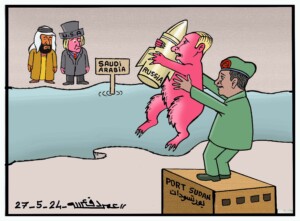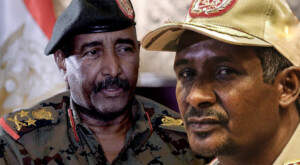Rebel alliance demands Sudan hand Al Bashir regime leaders to The Hague
The Sudan Revolutionary Front (SRF), an alliance of armed rebel movements, demands that the leaders of the former regime be extradited to The Hague to be held accountable by the International Criminal Court (ICC) for crimes committed against the Sudanese people, especially in the remote and marginalised areas of the country.
 The peace talks between the Sudanese government and the armed movements in Juba (Social media)
The peace talks between the Sudanese government and the armed movements in Juba (Social media)
The Sudan Revolutionary Front (SRF), an alliance of armed rebel movements, demands that the leaders of the former regime be extradited to The Hague to be held accountable by the International Criminal Court (ICC) for crimes committed against the Sudanese people, especially in the remote and marginalised areas of the country.
The rebel alliance stressed that “it wants to be in the political kitchen where the country’s policies are cooked”. It aims to reach “a peace that establishes a new system”.
Addressing a commemoration service for fallen rebels of the Sudan Liberation Movement (SLM) led by Minni Minawi in Juba yesterday, the head of the SRF, El Hadi Idris, demanded that a fund be set up to care for the families of rebels who were killed in the armed struggle.
He asserted that “peace is near, because of the will and determination of all parties to reach it”.
JEM
The deputy head of the Justice and Equality Movement (JEM), Mohamed Bakheet, stressed that the struggle still continues. He also confirmed that the just and comprehensive peace, which JEM fights for, is nigh.
The representative of the SPLM-North under the leadership of Malik Agar, Ahmed Badei, asserted that the people of Blue Nile and South Kordofan “are not second-class Sudanese”. He called on Khartoum to deal with the issues in the marginalised areas of the country and not to regard people there as inferior.
Spokesman for the Sudan Revolutionary Front (SRF) and head of the opposition Beja Congress, Osama Saeed, asserted that “the SRF does not want to follow the quotas approach”. He stressed that the SRF is taking part in the negotiations, so that the voice of the people in the marginalised areas can be heard and a new system, peace, justice, and equality can be established.
Saeed said he considers the crisis in Sudan at bottom as a management crisis.
Mohamed Daoud, head of the Kush Liberation Movement, said that there will be no freedom and democracy without reaching a just and comprehensive peace that addresses the roots of the problem.
Minni Minawi
Sudan Liberation Movement faction head Minni Minawi said that achieving peace in Sudan depends on a constitution that satisfies all and does not exclude anyone.
He demanded that dialogue be given sufficient time in order to be able to reach a “national pact” that brings together all the forces in Sudan and determines the relationship of all people in Sudan to each other.
He said the constitution must determine how Sudan is to be governed. He claims that “the ‘pre-established constitutional conference’ will keep the state in the hands of the elite and the marginalised people marginalised in the marginalised areas”.
Minawi said that a just and comprehensive peace must guarantee the return of the displaced and refugees to their lands and the opportunity for the armed movements to adjust their status without impediment.
He also demanded that no more governors and legislative councils will be appointed. He sees recent and current appointments as a preliminary step to form institutions through which elections could be rigged.
He also called for the establishment of a national ‘Day of the Martyrs’, on which all people killed across the country could be commemorated.
Darfur track
On Sunday, the delegations of the government and the SRF on the Darfur track continued the discussion on transitional justice, accountability and reconciliation. The role of the International Criminal Court (ICC) was discussed as well.
Mediation spokesman Dhieu Mathok said that the two sides reached “a lot of consensus” on these issues, including the establishment of courts at Darfur level and traditional courts, which can deal with crimes committed in Darfur.
He claimed an agreement was reached on the mechanisms to establish a commission on reconciliation.
Government
The spokesperson for the government delegation, Sovereign Council member Mohamed El Taayshi, confirmed that the two parties discussed the transitional justice and reconciliation paper regarding Darfur. He called it one of the most complex issues, “as grave human rights violations, both criminal and non-criminal, affected many people in Darfur during the war”.
He noted that they have reached an agreement on more than 50 per cent of the issues at the table. He stressed that everybody wants all perpetrators of “private and non-private crimes” in Darfur to be brought to justice.
Mohamed Abunumou, chief negotiator of the SLM under the leadership of Minni Minawi, confirmed that everybody at the Darfur negotiation table agrees on the importance of achieving justice and bringing war criminals to justice. He stressed that the parties in Juba agreed on most of the core issues related to the mechanisms to achieve justice and reconciliations, and to end impunity.
The chief negotiator of the Justice and Equality Movement, Ahmed Tugud, explained that the discussion at the Darfur track focused on holding those who committed crimes accountable. He stressed sufficient space must be created for the social fabric to be repaired and reconciliation reached. The mechanisms on how to achieve reconciliation were agreed upon, he said.
The chief negotiator of the Sudan Liberation Movement-Transitional Council, Nimir Abdelrahman, described the Darfur negotiation process as “transparent and responsible”. There was a “positive atmosphere”, he claimed. “Justice is one of the pillars of peace.”
The chief negotiator of the Sudan Liberation Forces Alliance, Ibrahim Zariba, pointed out that the parties agreed on national and hybrid judicial mechanisms in order to achieve justice.
Radio Dabanga’s editorial independence means that we can continue to provide factual updates about political developments to Sudanese and international actors, educate people about how to avoid outbreaks of infectious diseases, and provide a window to the world for those in all corners of Sudan. Support Radio Dabanga for as little as €2.50, the equivalent of a cup of coffee.












 and then
and then